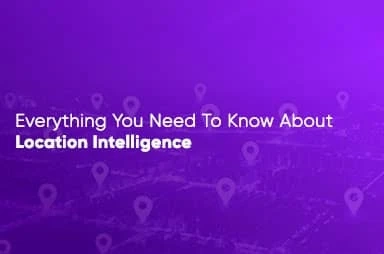Location Intelligence (LI) is a powerful concept that combines geographical data with business intelligence to provide valuable insights and make informed decisions. Here's a quick overview of what you need to know about Location Intelligence:
What is Location Intelligence?
Location Intelligence, often referred to as spatial analytics or geospatial intelligence, It is the process of gaining knowledge from location data. It aids in answering spatial questions. The foundation of location intelligence is visualization and geographic data analysis. The latter improves comprehension. It provides insights into and aids in the forecast of relevant queries. It is concerned with location, time, maps, people, societal issues, and even commercial concerns.
Importance of Location Intelligence
Location is a fundamental aspect of many business operations. Location Intelligence helps organizations understand the context of their data by providing insights into customer behavior, market trends, spatial relationships, and resource allocation. It enables businesses to optimize operations, enhance customer experience, target marketing efforts, and identify new opportunities.
Data Sources for Location Intelligence: Location Intelligence relies on a wide range of data sources, including geospatial data, GPS data, mobile device data, satellite imagery, social media check-ins, customer address information, and various other location-specific datasets. These sources provide the necessary spatial context for analysis and decision-making.
Technologies and Tools: Location Intelligence utilizes advanced technologies and tools to process, analyze, and visualize geospatial data. Geographic Information Systems (GIS), mapping software, data visualization tools, and spatial databases are commonly used to manipulate and extract insights from location-based data.
Use Cases of Location Intelligence
Location Intelligence has numerous applications across industries. It can be used for site selection and market analysis, supply chain optimization, logistics and fleet management, risk assessment, urban planning, environmental monitoring, real estate analysis, and much more. LI enables businesses to understand spatial relationships, optimize resources, and drive operational efficiency.
Benefits of Location Intelligence
Implementing Location Intelligence can bring several benefits to organizations. It helps improve decision-making by providing a comprehensive view of data in a spatial context. LI enables businesses to identify new market opportunities, enhance customer targeting, mitigate risks, optimize resource allocation, and improve overall operational performance.
Limitations of Location Intelligence
While Location Intelligence offers valuable insights, it also has limitations. Data quality and accuracy, computational complexity, and interpretability of spatial patterns can pose challenges. Organizations should be aware of these limitations and use LI as part of a broader decision-making process.
Emerging Trends: Location Intelligence continues to evolve with advancements in technology. Trends such as real-time location analytics, the integration of artificial intelligence and machine learning algorithms, and the rise of Internet of Things (IoT) devices are shaping the future of LI, enabling more dynamic and context-aware insights.
Location Intelligence empowers organizations to understand the "where" behind their data, enabling them to make more informed decisions, optimize operations, and unlock valuable insights. Embracing LI can help businesses thrive in an increasingly location-aware world.
Read More: About of Location Intelligence



